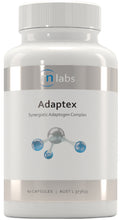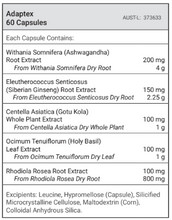RN Labs' Adaptex 60 capsules
Short Dated: End of Nov 2024
- Supports healthy stress response in the body
- Regulates nervous system and immune system function
- Promotes adaptive resilience during times of physical and mental demand
- Promotes physical endurance capacity
- Promotes mental wellbeing
- Can be used in conjunction with laboratory hormone test results (eg. High Cortisol, and/or High Cortisol metabolites)
Suggested use
Adults: Take 1-3 capsules per day or as prescribed by your healthcare practitioner.
Pure & Free From
This product does NOT contain any wheat, gluten, dairy, lactose, egg, yeast, soy, artificial colours, artificial sweeteners, or artificial flavours. This product also does not contain artificial preservatives, stearate lubricants and other commonly detrimental excipients.
Known Side Effects
Given the potential for Withania and Siberian Ginseng to lower excessive blood sugar levels, monitoring blood glucose in those taking anti-diabetic medications would be prudent.
Rhodiola Rosea has demonstrated CYP450 inhibitory activity. It is therefore recommended to monitor the efficacy of doses of any other co-prescribed medications.
Warning
Avoid use during pregnancy and lactation.
Several studies have shown Withania to support stress adaptation.
In one study, Cortisol levels were reduced compared with placebo, in which participants also showed improvement in sleep quality, while another study trialling Withania for its stress-relieving activity concluded it to have a positive effect in 65 healthy stressed adults.
Results showed statistically significant reductions in the Hamilton Anxiety Rating Scale (HAM-A) and the Depression, Anxiety, and Stress Scale -21 (DASS-21). Reductions in morning Cortisol were also seen.
Gotu Kola has been shown to be effective in attenuating the acoustic startle response (ASR), which may be supportive during times of stress.
Holy Basil (also known as Tulsi), is an indigenous herb to the Indian continent. It has a long history of use in the Ayurvedic System of Medicine as an adaptogen, to improve resilience under ongoing or long-term stress. Many studies have shown favourable clinical outcomes for lifestyle-related chronic maladaptation states
Rhodiola Rosea showed significant benefit in burnout affected patients with stress-related fatigue when compared with the control group.
Exposure to stressors increases Cortisol levels, which is directly associated with physical exhaustion.
During chronic stress where levels of Cortisol are extremely high, the body can experience immune suppression along with muscle wastage and inflammatory responses
One trial revealed Siberian Ginseng to be beneficial for stress adaptation (relative to the control group) when they were subjected to stressful cognitive tasks and experienced a significant improvement in total mood.
Studies:
Withania Somnifera (Withania)
Bonilla DA, Moreno Y, Gho C, Petro JL, Odriozola-Martinez A, 2021, Effects of Ashwagandha (Withania somnifera) on Physical Performance: Systematic Review and Bayesian Meta-Analysis. Journal of Functional Morphology and Kinesiology. vol. 6, no. 20, pp. 1-31
Chandrasekhar K, Kapoor J, Anishetty S, 2012, A Prospective, Randomized Double-Blind, Placebo-Controlled Study of Safety and Efficacy of a High-Concentration Full-Spectrum Extract of Ashwagandha Root in Reducing Stress and Anxiety in Adults. Indian Journal of Psychological Medicine, vol. 34, no. 3, pp. 255-262
Lopresti AL, Smith SJ, Malvi H, Kodgule R, 2019, An investigation into the stress-relieving and pharmacological actions of an ashwagandha (Withania somnifera) extract: A randomized, double-blind, placebocontrolled study. Medicine (Baltimore), vol. 98, no. 37, pp. E17186
Maurya SP, Das BK, Singh R, Tyagi S, 2019, Effect of Withania somnifer on CD38 expression on CD8+ T lymphocytes among patients of HIV infection. Clinical Immunology, vol. 203, pp. 122-124
Salve J, Pate S, Debnath K, Langade D, 2019, Adaptogenic and Anxiolytic Effects of Ashwagandha Root Extract in Healthy Adults: A Double-blind, Randomized, Placebo-controlled Clinical Study. Cureus, vol. 11, no. 12, pp. e64666
Wankhede S, Langade D, Joshi K, Sinha SR, Bhattacharyya S, 2015, Examining the effect of Withania somnifera supplementation on muscle strength and recovery: a randomized controlled trial. Journal of the International Society of Sports Medicine, vol. 12, pp. 43
Rhodiola Rosea (Rhodiola)
Anghelescu IG, Edwards D, Seifritz E, Kasper S, 2017, Stress management and the role of Rhodiola rosea: a review. International Journal of Psychiatry in Clinical Practice, vol. 22, no. 4, pp 242-252
Ballmann CG, Maze SB, Wells AC, Marshall MM, Rogers RR, 2018, Effects of short-term Rhodiola Rosea (Golden Root Extract) supplementation on anaerobic exercise performance. Journal of Sports Sciences, vol. 37, no. 9, pp. 998-1003
Concerto C, Infortuna C, Muscatello MRA, Bruno A, Zoccali R, Chusid E, Aguglia E, Battaglia F, 2018, Exploring the effect of adaptogenic Rhodiola Rosea extract on neuroplasticity in humans. Complementary Therapies in Medicine, vol. 41, pp. 141-146
Cropley M, Banks AP, Boyle J, 2015, The Effects of Rhodiola rosea L. Extract on Anxiety, Stress, Cognition and Other Mood Symptoms. Phytotherapy Research. vol. 29, no. 12, pp. 1934-1939
Darbinyan V, Kteyen A, Panossian A, Gabriellien E, Wikman G, Wagner H, 2000, Rhodiola rosea in stress induced fatigue — A double blind cross-over study of a standardized extract SHR-5 with a repeated low-dose regimen on the mental performance of healthy physicians during night duty. Phytomedicine, vol. 7, no. 5, pp. 365-371
Kasper S, Dienel A, 2017, Multicenter, open-label, exploratory clinical trial with Rhodiola rosea extract in patients suffering from burnout symptoms. Neuropsychiatry Disease and Treatment, vol. 13, pp. 889- 898
Lekomtseva Y, Zhukova I, Tartakovsky I, 2013, Therapy effects and safety of Rhodiola Rosea extract WSVR 1375 in subjects with symptoms of chronic fatigue. The Siberian Scientific Medical Journal, vol. 12, no. 5, pp. 73-75
Ross SM, 2014, Rhodiola rosea(SHR-5), Part IA Proprietary Root Extract of Rhodiola roseais found to be Effective in the Treatment of Stress-Related Fatigue. Herbals and Nutritional Supplements, Holistic Nursing Practice, vol. 28, no. 2, pp. 149-154
Spasov AA, Wikman GK, Mandrikov VB, Mironova IA, Neumoin VV, 2000, A double-blind, placebo-controlled pilot study of the stimulating and adaptogenic effect of Rhodiola rosea SHR-5 extract on the fatigue of students caused by stress during an examination period with a repeated low-dose regimen. Phytomedicine, vol. 7, no. 2, pp. 85-89
Eleutherococcus Senticosus (Siberian Ginseng)
Fachinetti F, Neri I, Tarabusi M, 2002, Eleutherococcus senticosus reduces cardiovascular stress response in healthy subjects: a randomized, placebo-controlled trial. Stress & Health, vol. 18, no. 1, pp. 11-17
Ocimum Tenuiflorum (Holy Basil)
Jamshidi N, Cohen MM, 2017, The Clinical Efficacy and Safety of Tulsi in Humans: A Systematic Review of the Literature. Evidence Based Complementary and Alternative Medicine, vol. 2017, no. 9217567, pp. 1-13
Mondal S, Varma S, Bamola VD, Naik SN, Mirdha BR, Padhi MM, Mehta N, Mahapatra SC, 2011, Double-blinded randomized controlled trial for immunomodulatory effects of Tulsi (Ocimum sanctum Linn.) leaf extract on healthy volunteers. Journal of Ethnopharmacology, vol. 136, no. 3, pp. 452-456
Richard EJ, Illuri R, Bethapudi B, Anandhakumar S, Bhaskar A, Velusami CC, Mundkinajeddu D, Agarwal A, 2016, Anti-stress Activity of Ocimum sanctum: Possible Effects on Hypothalamic-PituitaryAdrenal Axis. Phytotherapy Research, vol. 30, no. 5, pp. 805-814
Saxena RC, Singh R, Kumar P, Negi MPS, Saxena VS, Geetharani P, Allan JJ, Venkateshwarlu K, 2011, Efficacy of an Extract of Ocimum tenuiflorum (OciBest) in the Management of General Stress: A Double-Blind, Placebo-Controlled Study. Evidence Based Complementary and Alternative Medicine, vol. 2012, no. 894509, pp. 1-7
Centella Asiatica (Gotu Kola)
Bradwejn J, Zhou Y, Koszycki D, Shlik J, 2000, A double-blind, placebo-controlled study on the effects of Gotu Kola (Centella asiatica) on acoustic startle response in healthy subjects. Journal of Clinical Psychopharmacology, vol. 20, no. 6, pp. 680-684



